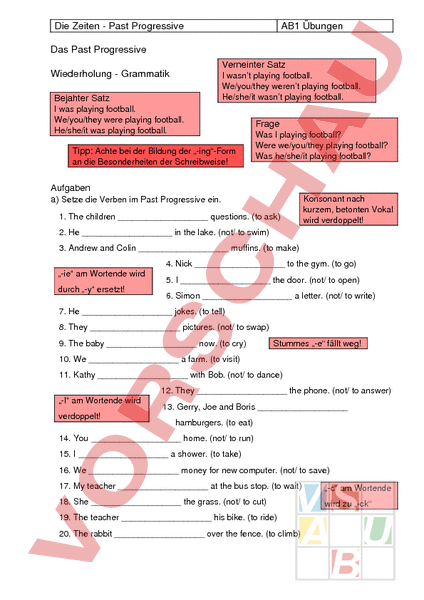Arbeitsblatt: Übung zum Pastprogressive
Material-Details
Mehrere aufeinander aufbauende Arbeitsblätter mit vielseitigen Übungen zum Past Progressive. Enthält Grammatik und Übungen zum Past Progressive und eine Gegenüberstellung zum Simple Past.
Englisch
Grammatik
6. Schuljahr
4 Seiten
Statistik
82952
814
6
16.06.2011
Autor/in
Jessica Horster
Land: Deutschland
Registriert vor 2006
Textauszüge aus dem Inhalt:
Die Zeiten Past Progressive AB1 Übungen Das Past Progressive Verneinter Satz Wiederholung Grammatik wasnt playing football. We/you/they werent playing football. He/she/it wasnt playing football. Bejahter Satz was playing football. We/you/they were playing football. He/she/it was playing football. Tipp: Achte bei der Bildung der „ingForm an die Besonderheiten der Schreibweise! Frage Was playing football? Were we/you/they playing football? Was he/she/it playing football? Aufgaben a) Setze die Verben im Past Progressive ein. 1. The children questions. (to ask) Konsonant nach kurzem, betonten Vokal wird verdoppelt! 2. He in the lake. (not/ to swim) 3. Andrew and Colin muffins. (to make) „ie am Wortende wird durch „y ersetzt! 4. Nick to the gym. (to go) 5. the door. (not/ to open) 6. Simon letter. (not/ to write) 7. He jokes. (to tell) 8. They pictures. (not/ to swap) 9. The baby now. (to cry) Stummes „e fällt weg! 10. We farm. (to visit) 11. Kathy with Bob. (not/ to dance) „l am Wortende wird verdoppelt! 12. They the phone. (not/ to answer) 13. Gerry, Joe and Boris hamburgers. (to eat) 14. You home. (not/ to run) 15. shower. (to take) 16. We money for new computer. (not/ to save) 17. My teacher at the bus stop. (to wait) „c am Wortende 18. She the grass. (not/ to cut) wird zu „ck 19. The teacher his bike. (to ride) 20. The rabbit over the fence. (to climb) Die Zeiten Past Progressive AB2 Übungen b) Verneine die vorgegebenen Sätze im Past Progressive. 1. The girls were riding their bikes. 2. He was taking out book. 3. was washing my hair. 4. The baby was crying 5. You were listening to music. 6. The dog was running after the cat. 7. She was sitting on the chair. 8. My mum was preparing lunch now. 9. We were carrying buckets. 10. The teacher was opening the window. Tipp: Das Past Progressive tritt meist zusammen mit dem Simple Past auf. Signalwörter sind dabei „while (im PastProgressiveSatz) und „when (im SimplePastSatz). Die Sätze beschreiben eine Gleichzeitigkeit zu einander. c) What were the persons on the picture doing? Describe what you see and use Past Progressive. d) Frage nach dem unterstrichenen Satzteil. 1. Sheila was sitting on the sofa. 2. They were playing cricket. 3. Anne was walking with the dog. 4. was writing three emails. 5. The ghost was disappearing. Die Zeiten Gegenüberstellungen AB1 Übungen Aufgaben a) Setze die in Klammern stehenden Verben entweder im Simple Past oder im Past Progressive ein. 1. While, the school bus. (to text/ to arrive) 2. Cindy her leg while she. (to break/ to snowboard) 3. He to the radio while hebreakfast. (to listen/ to prepare) 4. My father at 70 km/h when policeman him. (to drive/ to stop) 5. The girl that the boy her. (to notice/ to watch) 6. While we we crossword puzzles. (to wait) (to do) 7. Nick sick while he in Texas. (to become/ to travel) 8. What when you about 9/11? (to do/ to hear) 9. She said that she happy, so to her. (not/to feel) (to talk) 10. my keys while to school. (to lose/ to walk) Tipp: Wenn du ausdrücken möchtest, dass eine Handlung noch andauert, während eine neue, kurze Handlung eintritt, benutzt du das Past Progressive. Die neu eintretende Handlung wird mit dem Simple Past ausgedrückt. b) Setze die in Klammern stehenden Verben entweder im Simple Past oder im Past Perfect ein. 1. After Fred (to spend) his holiday in Italy he (to want) to learn Italian. 2. Jill (to phone) Dad at work before she (to leave) for her trip. 3. Susan (to turn on) the radio after she (to wash) the dishes. 4. When she (to arrive) the match already (to start). 5. After the man (to come) home he (to feed) the cat. Tipp: Wenn du betonen möchtest, dass sich ein Ereignis vor einem anderen in der Vergangenheit abgespielt hat, drückst du dies mit dem Past Perfect aus. Die Zeiten Gegenüberstellungen AB1 Übungen Aufgaben: a) Setze die Verben in Klammern im Past Perfect in die Lücken ein. 1. He told me that he his brother the other day. (not/to speak) 2. Gerry helped his grandma in the house because his father him so. (to tell) 3. The cat hit under the chair because the children so loud. (to be) 4. Lisa the book, so she didnt understand the film. (not/to read) 5. The Smiths the new camera, so they could spend the money on new furniture. (not/to buy) 6. Before the students started to write, the teacher their mobile phones. (to collect) 7. didnt find my keys because under the bed. (not/to look) 8. After Max his breakfast, he left the flat. (to finish) 9. We enough, so we lost the match. (not/to practise) 10. Laura repaired her glasses because her brother them. (to break) b) Zähle 10 Sehenswürdigkeiten in London auf und gib eine kurze Erklärung zu jedem. c) Setze die Verben in Klammern im Past Progressive in die Lücken ein. 1. She the lunch basket. (to pack) 2. . (not/to whisper) 3. he to help? (to try) 4. The men at the street corner. (not/to fight) 5. Frank the grass. (to cut) 6. you during the last lesson? (to sleep) 7. They stickers. (to swap) 8. The guest the whole evening. (to dance) 9. We in the tree house. (not/to live) 10. it dark? (to get) d) Erkläre die Bedeutung der folgenden Wörter auf Englisch. 1. landmark 2. fortress 3. pickpocket 4. purse 5. exhibition
